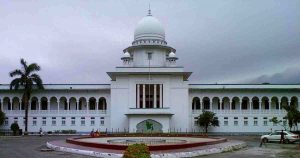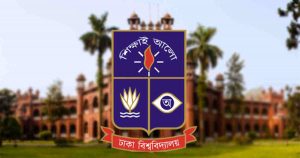Greenwatch Desk
Speakers at a roundtable in the city on Saturday underscored the need for celebrating the centenary of the University of Dhaka for seven years from the date of announcement of the decision to set up the highest seat of learning in 1913 to its formal opening in 2021.The roundtable organised by the Centre for National Culture attracted resource persons from all backgrounds and the discussion was quite rich in analysing the genesis and the contribution of the university to improve the lot of the people of the land – Bangladesh.
The speakers recalled the glorious roles of Nawab Sir Salimullah, Nawab Nawab Ali Chowdhury and other influential people of the time who helped turn the institution of Dhaka University into a reality.
Prof. Emajuddin Ahmed, for vice-chancellor of Dhaka University who was the chief guest at the roundtable underscored the need for reaching the voices of the educated citizens to the present management of the varsity that it was not pursuing the ideals it was meant for.
He said that the university was now passing through a dark era and it was needed to hold centenary programmes at the Nawab Nawab Ali Chowdhury Senate building auditorium to sound the voices of those who got the opportunity of higher education only because of the setting up of the university against stong opposition of the Kolkata-centric elite of those days.
The roundtable was also addressed by former vice president of DUCSU Mojahidul Islam Selim, former pro-vice chancellor of the university Prof. Yusuf Haider, members DU Syndicate Prof. Tazmeri Islam, former police IG Dr. Enamul Huq, Naya Diganta editor Alamgir Mohiuddin, eminent journalist Ershad Majumder, Dr. Sukomal Barua, Dr. Abul Kasem Fazrul Huq and Asaduzzaman Ripon among others.
Dr. AKM Fazlul Huq reminded the audience that the university was set up against a much bigger social background that it is commonly thought and reminded all that the influential Muslim leaders of Bengal had voted against the Partition of the land in 1947, though they wanted an independent entity the people.
Dhaka and the rest of then East Bengal had been treated a hinterland, and its majority Muslim population comprised people mostly from Buddhists and low caste Hundus. The decision to set up the university was a response to meeting the cravings of people that grew in the aftermath of the European renaissance, he said.
Other speakers deplored that the university which once created world class scientists like Satyen Bose has missed the link to the pursual of search to find new frontiers of knowledge. Some speakers said that in the melee of cheap politics the contributions of great sons of the soil towards the setting of the university are not properly evaluated.




